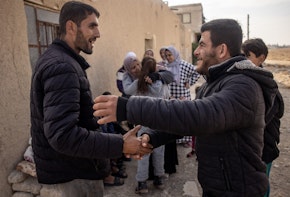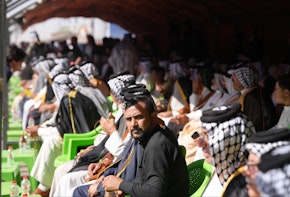Egypt’s Muslim Brotherhood is today being pushed to the limits of its adaptability—and perhaps its utility. After a brief year in power, the organization’s leaders now languish in prison or exile, while its followers face greater state repression than ever before.
Based on unprecedented access to Brotherhood leaders, rank-and-file members, and internal dissenters, the new book Broken Bonds: The Existential Crisis of Egypt’s Muslim Brotherhood, 2013–22 takes a revisionist, granular view of the organization. The Brotherhood and its detractors alike have misunderstood it as a mass ideological organization, missing its evolution into an elite membership organization disconnected from its constituents.
In this original Century International book, researchers Abdelrahman Ayyash, Amr ElAfifi, and Noha Ezzat argue that the Brotherhood is experiencing multiple crises—of identity, legitimacy, and membership—which accelerated after Egypt’s military coup in July 2013. Through myriad stories and voices from within a fragmenting movement, the authors present a nuanced portrait of a once-formidable grassroots organization.
They argue that the Brotherhood has fallen out of touch with its animating ideas and popular following. But the same factors that have driven it to the margins today could catalyze a future revival. The fresh analysis in Broken Bonds will serve as a welcome corrective for policymakers, researchers, and all observers of Egyptian politics.
Broken Bonds is available online and from booksellers, and is part of “Faith and Fracture,” a TCF project supported by the Henry Luce Foundation.
Download Broken Bonds: The Existential Crisis of Egypt’s Muslim Brotherhood, 2013–22.
About the Authors
Abdelrahman Ayyash is a fellow at Century International and director of the Egyptian Muslim Brotherhood working group. Ayyash is an award-winning journalist and a researcher specialized in Islamic movements. He holds an MA in global affairs from Bahcesehir University in Istanbul, Turkey. He translated three books on civil-military relations and the Muslim Brotherhood. He has published reports and articles about the Muslim Brotherhood for institutions including the Carnegie Endowment for International Peace and the Arab Reform Initiative.
Amr ElAfifi is a PhD candidate at Syracuse University where he works on the relationship between trauma and political participation. He is also the research manager at the Freedom Initiative where his work is focused on conditions of detainment and how they affect political prisoners and their loved ones. Prior to these positions, Amr worked at the World Bank where he focused on bettering investment climates in fragile and conflict countries.
Noha Ezzat is a writer and researcher. Her work focuses on geopolitics, and political and historical sociology, with a focus on Egypt, Turkey, and Iran. She holds a master’s in international relations from Durham University with a thesis on war and modernization in Iran. Noha has published research work and articles for Durham University’s Institute of Islamic and Middle Eastern Studies, Al Jazeera Center for Studies, Carnegie Endowment for International Peace, and Hungary’s Institute for Trade and Foreign Affairs.
What You Should Know
- Egypt’s Muslim Brotherhood is today being pushed to the limits of its adaptability—and perhaps its utility. After a brief year in power, the organization’s leaders now languish in prison or exile, while its followers face greater state repression than ever before.
- Based on unprecedented access to Brotherhood leaders, rank-and-file members, and internal dissenters, this study takes a new granular view of the organization. The Brotherhood and its detractors alike have misunderstood it as a mass ideological organization, missing its evolution into an elite membership organization disconnected from its constituents.
- The Brotherhood is experiencing multiple crises—of identity, legitimacy, and membership—which accelerated after Egypt’s military coup in July 2013.
- Common misconceptions among policymakers, researchers, and other observers of Egyptian politics hold that repression directly spurs extremist violence, or that the Brotherhood can be conclusively banished from politics. This study shows that repression spurs a range of outcomes among the Brotherhood’s Islamist constituency.
- The Brotherhood has fallen out of touch with its animating ideas and popular following. But the same factors that have driven it to the margins today could catalyze a future revival.
- Broken Bonds is also available as a book, and is part of “Faith and Fracture,” a TCF project supported by the Henry Luce Foundation.





